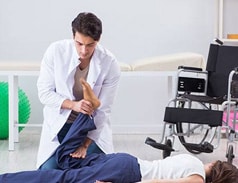Did you know that not all ACL tears require surgery?
The majority of ACL injuries are managed with surgical interventions and post surgery rehab these days. However, a lot of people don’t even know that you can even manage ACL injuries without surgery in a lot of cases. Recent studies have shown that even after an ACL reconstruction, only 44% of athletes return to competitive sports. Studies also showed that the percentage of people who developed knee osteoarthritis 20 years post injury were not significantly different in those who have had reconstruction and those who were managed conservatively. There was not enough evidence to say whether surgical or non-surgical intervention had superior results in functional outcomes long term. However, not all ACL injuries have good prognosis if managed conservatively.
The need for surgery highly depends on the type of activities you would want to return to. If you are a generally active person who wants to go back to high level sports with moderate knee laxity, then surgery might be the best option for you. A more complicated ACL injury which involves meniscal damage or damage to other ligaments might also mean that surgery could be the best option. However, if you want pain free knee movement and are not planning to do high level sports, or if you have a simple ACL injury, you might be suitable for conservative management. Another thing to note is also that even with surgery, you would still need to do prehab and approximately 12 months rehab to strengthen up your muscles and to return to sports successfully. If you want to check if you are a good candidate for conservative management, give us a call and book an appointment with us at Miami or Lakelands Physiotherapy.
It is vital that exercises after an ACL injury are guided by your physiotherapist, especially in the early days. You also need to manage swelling.
Some tips and tricks to manage swelling can be summarized with the P.O.L.I.C.E principle.
“P” stands for protection – however this does not mean complete immobilization. What this means is that in the early days, it could be best to have a knee brace and potentially crutches to help offload your injured knee.
“OL” stands for optimal loading, which is finding the perfect amount of load your knee can tolerate in the early stage. This is best done with a physiotherapy consultation – to make sure that you’re not over- or under-loading your knee. Optimal loading can help accelerate your healing, and the right amount of activity can actually decrease oedema.
The “ICE” is your normal ice, compression, and elevation. Remember, don’t ice for more than 20 minutes, and when elevating, make sure that your swelling site is above the level of your heart.
If you want to learn more, or if you recently injured your ACL, give us a ring and book an appointment with us at Miami or Lakelands Physiotherapy.

